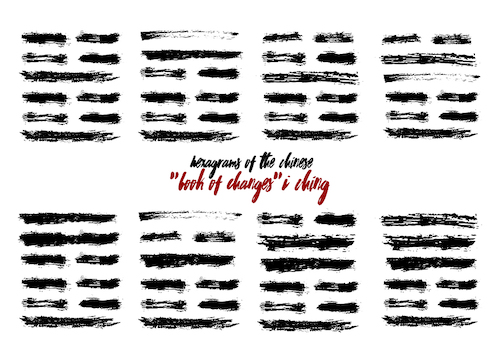Of all the cultures in the world that have studied numerology, the Chinese are often credited with beginning the practice first. The earliest recordings of ancient Chinese numerological studies are from over 4,000 years ago, but perhaps the most remarkable part is that many Chinese continue the practice today. What are some of the basic concepts of Chinese numerology? Which concepts are in use today?
Emperor Fu Hsi
There exists a wealth of famous tales about each of the five legendary emperors of China, but perhaps none is as well known as that of Emperor Fu Hsi. Fu Hsi was the first of the mythical emperors, and was said to have come to life as a divine being with a serpent’s body in about the year 2852 BC. Later, he was depicted as a divine head situated on a mountain, in homage to the great gifts he gave humankind, such as the ability to hunt animals with iron weapons, fish with nets, cook with fire, and marry other humans. However, his greatest contribution is considered a neurological gift.
Legend says that one day, Fu Hsi was walking along a river when he observed a unique turtle, already a lucky omen. On its shell, the turtle carried markings of a 3×3 grid. Coupled with his later visions of events and things occurring in threes, Fu Hsi formed the Lo Shu grid, a 3×3 square comprised of numbers that add up to 15 regardless of which row, column, or diagonal you select.
Basic Concepts
From there, Fu Hsi formed the basic tenets of the I Ching, used to explain whether a particular number is good or bad, lucky or unlucky. Most of these descriptions hinge on what the number sounds like when spoken aloud. Other beliefs based on the Lo Shu grid include feng shui, Chinese astrology, and Taoism.
Overall, six basic concepts of Chinese numerology are among those we hear about today. These basic concepts encompass many of the terms most familiar to Westerners:
Yin
Numbers are either yin or yang, also described as even or odd. Yin numbers are even, such as 2,4,6,8 and so on. Some numerologists consider even numbers the luckiest, while others disagree. Twos are considered lucky, while fours are not lucky at all.
Yang
Yang numbers are odd numbers. Again, there is discrepancy over which is considered to be generally luckier, though threes are considered lucky while other odd numbers are not often considered lucky.
Lucky Numbers
Much of Chinese numerology concerns lucky numbers. Most of the lucky numbers are considered so because they sound like words that carry a positive meaning. For example, 6 is considered lucky because its Cantonese word sounds very similar to the word for “profitable.” 8 and 9 are also considered especially lucky numbers.
Unlucky Numbers
Like lucky numbers, unlucky numbers have homophones – however, their homophones often carry negative meaning. For example, 4 is considered especially unlucky because it sounds much like the Cantonese word for death.
Feng Shui
Feng Shui is based on the homophone principles that some numbers are lucky because they sound like words that have positive associations. Numbers also have an associated direction, allowing a practitioner to analyze a home or other building to determine how the space affects the people inside it, and what changes could be made to promote desirable qualities. A home with a harmonious flow of energy, or Chi, based on the associated feng shui numbers, is desirable.
Kua Numbers
Kua numbers are similar to other forms of numerology, where your birthdate is used to calculate a number which analyzes your feng shui needs. For men, you will need to add the last two digits of your birth year until you get a single number. For women, add the last two digits until you get a single number, then add 5; if necessary, add until you again reach a single number. This number’s associated properties are said to group you into either an East or a West feng shui group, and describes your lucky directions to face while working or sleeping.
Today’s Chinese Numerology
As mentioned, many of these practices are used today in modern Chinese numerology. Decisions are made regarding the stock market, based on numerology. Homes are considered and rejected based on the house numbers they bear – house numbers including 4 may be rejected due to the unlucky association with death. Even the most skeptical westerners can subscribe to the ideas of feng shui.
Overall, there is much we can learn through the study of Chinese numerology. The practice has been around for over 4,000 years and is not likely to go anywhere soon. Perhaps you can incorporate Chinese numerology into your own studies of how numbers affect you and the world around you.

